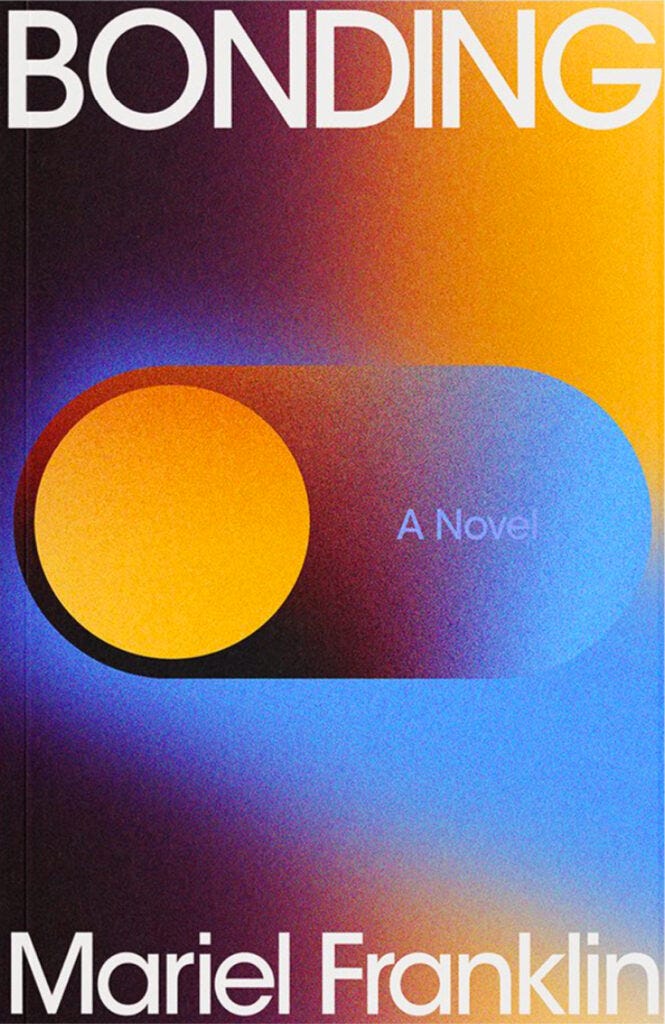Summer Reading: Bonding by Mariel Franklin
A bleak, bone-dry satire for the aspirant global monoculture
Somehow these days I end up not reading much fiction. But recently, by a happy coincidence I came across Bonding, the first novel by London-based writer Mariel Franklin. And my goodness I’m glad I did. Billed as satirical, it reads just as plausibly as tragedy; either way, it’s a note-perfect tale of 21st-century tech, disembodiment, alienation, and global monoculture, that deftly encompasses its own shadow without ever slipping into overt politics or moralism.
The story is narrated by Mary (I hope no coincidence), a thirtysomething of modest origins who lives in a mouldy London flat-share and works in tech industry marketing. No one around her seems to have solid friends, or spouses, or anything permanent at all; life is all surfaces, temporary acquaintances, and situationships - including Mary’s job, whence she is abruptly fired. Now unemployed, she travels to Ibiza for a week’s solo holiday, where she falls in with a wealthy group of Londoners sharing a holiday house, and meets Tom, a brilliant chemist, whom she then begins dating back in London. They fall in love, and Mary begins spending most of her time at Tom’s flat.
The only employment Mary is able to find is with an online dating startup for the sexually adventurous, Openr, founded by her privileged, charismatic, self-absorbed university ex-girlfriend, Lara. Mary, who finds herself still unhappily in Lara’s thrall, must now balance the ultra-progressive opinions she’s obliged to publish as writing marketing content for Openr, her own yearning for stability, intimacy, and permanence with Tom, and rapidly-converging trajectories of desire, technology, and professional obligation.
All these begin to converge when Tom begins work on launching Eudaxa, a revolutionary new “wellness” drug that turns out to have startling erotic side-effects. The action mostly happens in a glossy but unforgiving London of evaporated social norms, slick venues, loneliness, fading aspirations and widening divides between the haves and have-nots. Franklin deftly offsets this unreal and alienated milieu with the protagonists’ bewildered boomer parents, and the global monoculture’s bleak, post-industrial and aggressively diverse hinterlands, in provincial towns such as Luton.
Bonding deftly, but never didactically, weaves together the roiling pressure of internet cancel culture, Britain’s rising undercurrent of working-class interracial conflict, and - above it - the frantic scrabble of the knowledge class to fly high enough to secure a permanent escape from this angry, impoverished abyss. The book’s dust-jacket carries plaudits from the FT, the Observer, and Zadie Smith, which ought to tell you it’s not an overtly conservative text; but should you be other than progressively-minded, it more than merits a sideways read.
I don’t want to give away too much of the plot, which sets the amorality of modern knowledge-class work, the casual self-deceptions of therapy culture, and the bleak realities of 21st-century sexual hedonism against a bone-deep yearning for love and permanence - and the pitiless downward pressure exerted by every aspect of modern mainstream culture on that yearning. The plot is dark and pacy, and accelerates to a satisfyingly shocking end. It’s rare to come across a fictional world this acutely observed and sparsely sketched, and the ending stayed with me some time after I finished it.
Bonding is not exactly giddy escapism. It’s too on the nose for that. But if you don’t mind a bit of smut, you like your satire pitch-dark, and you’re after a compelling holiday read, this comes with my recommendation.
Bonding recently released in UK paperback, and publishes in US hardback on 22 July.





I reviewed it a while back if you’re interested in seeing another persons angle on it:https://open.substack.com/pub/deadgannet/p/bonding?r=74az0&utm_medium=ios
Bought the book yesterday. I’m on page 152 and enjoying it. Thanks!
There is a paragraph on page 84 I highlighted and will ask my 22 year old daughter’s opinion.